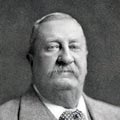On the Cattle Boats, Part 2
Round Pullo and Coro Coro the principal industry is raising stock for Lima. Although little natural grass grows here, the soil is well adapted for maize and barley and alfalfa. It is easy to obtain three crops of alfalfa in fifteen months. Fruit also is very plentiful.
Cattle often start off to Chala in nice fat condition, but, owing to the scarcity of grass before referred to, lose weight on the way down. The cruellest part of this cattle business is, however, that the owners are absolutely callous to the poor beasts’ sufferings, and notwithstanding that they have been practically four days without food, sling them aboard the steamer by their horns and let them get on as best they can for another two days, minus food and water. I remember one noble (!) gent shipping 200 head of cattle to Callao on the Santiago, in which I had consigned twenty-two racehorses, besides two carriage horses and my arab hack. My animals were all well fed twice a day; those belonging to the noble gent got nothing. The latter stood seeing my horses being fed a couple of days, and then about twenty of them broke loose and stampeded. I permitted my lads to assist in recapturing them, on the understanding that I was indemnified against all risks. When we got to Callao the N.G. aforesaid had to pay £200 before he was allowed to unship his cattle.
In my opinion drastic alterations are required. In the first place the animals should be shipped and unshipped as in Venezuela, viz. by making use of flat-bottomed boats and gangways. Hardships would thus be eliminated. As regards feeding, this could be easily managed all the way down from the valley to within fifteen miles of the port of embarkation. Sufficient alfalfa could be loaded up on forage carts which make their own track. Owners would be amply repaid for their extra trouble and expense by the additional money their beasts would fetch.
I once bought forty-four sheep in conjunction with Captain Amy, at Pickut Harbour, Smith’s Channel. At the same time a Frenchman took 800 from the same flock, and at the same price, for Mrs. Noguera. He neither fed nor watered them aboard the ship until two days out, and then only now and then. As a consequence several sheep died on the journey, and the remainder, when they reached Iquique, fetched 2s. less per head than he gave for them. Ours had been properly cared for, and each paid us a profit of 10s. The original price per sheep put aboard at Pickut Harbour was 8s., and freightage to Iquique raised this figure to 13s. When we arrived at our destination, the Frenchman’s uncared-for animals fetched 11s. each, sold by public auction; dealers were content to pay us 23s. apiece for ours, on board. Some difference that!
There is no doubt that the reason why our sheep fetched more than twice as much as the Frenchman’s was the careful manner in which they had been looked after and cared for by the captain, his good lady, and myself. Some of them were pretty sturdy, and that’s a fact.
Talking about Mrs. Noguera, I am reminded of her late husband. Portuguee Joe was something of a character. He had been half-owner of a big whaler and sold his share for £10,000. With the money thus obtained, he embarked in sealing on his own account, and also did a bit of gold digging. All of his profits he invested in sheep lands in Patagonia and at Pickut Harbour. He died a millionaire, and left the interest accruing from his vast possessions to his widow until she married again. Mrs. Noguera eventually hitched up with a captain of the Chilian navy. Before he became a benedict, Portuguee Joe speculated with a butcher named Brown. Said he to him one day, “Give me your daughter in marriage, and I will put some money into your business.” Brown was agreeable, although his daughter was but sixteen years of age, and Joe forty; so the wedding came off. I may add that the firm of Brown and Blanchard is to-day reputed one of the most wealthy in Sandy Point.
Joe and his partner suffered not a little from the peculations of passers-by. This is how Joe put a stop to the thievish practice. He hid behind the doors of their big stall, and whenever he noticed anyone trying to annex any of the meat, he would pop out and discharge a gun loaded with black powder and rock salt at their legs. Once was quite enough, in the majority of instances! The same method was successfully adopted by W. Hunt, a Chilian nicknamed Prussian Bill, who owned the famous racehorse Thunderer.
The captain and I were offered the contract to supply the nitrate fields of that popular sportsman, the late Colonel North, with 800 sheep and from 180 to 250 bullocks every six weeks. Only lack of capital prevented our taking it up.
As with sheep so with mules. I have frequently left Los Andes via Valparaiso with a skinny, decrepit lot en route for Callao by a slow steamer. Before they reached their destination they became quite fat and well. It only shows what a little common-sense treatment will do.
